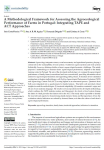Costa-Pereira I., Aguiar A.A.R.M., Delgado F., Costa C.A. (2024). A methodological framework for assessing the agroecological performance of farms in Portugal: integrating TAPE and ACT approaches. Sustainability, 02/05/2024, vol. 16, n. 10, p. 3955.
https://doi.org/10.3390/su16103955
https://doi.org/10.3390/su16103955
| Titre : | A methodological framework for assessing the agroecological performance of farms in Portugal: integrating TAPE and ACT approaches (2024) |
| Auteurs : | I. Costa-Pereira ; A.A.R.M. Aguiar ; F. Delgado ; C.A. Costa |
| Type de document : | Article |
| Dans : | Sustainability (vol. 16, n. 10, May 2024) |
| Article en page(s) : | p. 3955 |
| Langues : | Anglais |
| Langues du résumé : | Anglais |
| Catégories : |
Catégories principales 06 - AGRICULTURE. FORÊTS. PÊCHES ; 6.4 - Production Agricole. Système de ProductionThésaurus IAMM AGROECOLOGIE ; TRANSITION AGROECOLOGIQUE ; SYSTEME DE PRODUCTION ; PERFORMANCE ; EXPLOITATION AGRICOLE ; PORTUGAL |
| Résumé : | Agroecology integrates science, social movements, and agricultural practices, playing a central role in the sustainability of food systems. It addresses agroecosystems and food systems holistically; however, defining whether a farm is agroecological remains a challenge. This article proposes a methodology to measure farms’ agroecological performance, adapted to the family farming context in Portugal. The aim of the developed methodology is to compare the agroecological performance of family farms (conventional and non-conventional), providing information about anchors for agroecological transition and supporting public policies. A literature review identified existing farm evaluation methodologies, with Tool for Agroecological Performance Evaluation (TAPE) and Agroecology Criteria Tool (ACT) scoring highest in an assessment process. Questions from both were integrated into a questionnaire for family farmers. This field work provided critical insights towards the methodologies: (1) territorial adaptability; (2) transition constraints’ origin; and (3) use of non-academic language. The results were incorporated into the developed methodology, which combines the TAPE indicator matrix and Gliessman’s five levels of food system change, the latter of which provides the framework for the ACT. This study made it possible to identify the most relevant aspects for characterizing family farmers/farms and the importance of how the evaluation criteria/indicators are ordered by element/theme, as it alters the values of each farm’s agroecological performance. |
| Cote : | En ligne |
| URL / DOI : | https://doi.org/10.3390/su16103955 |







